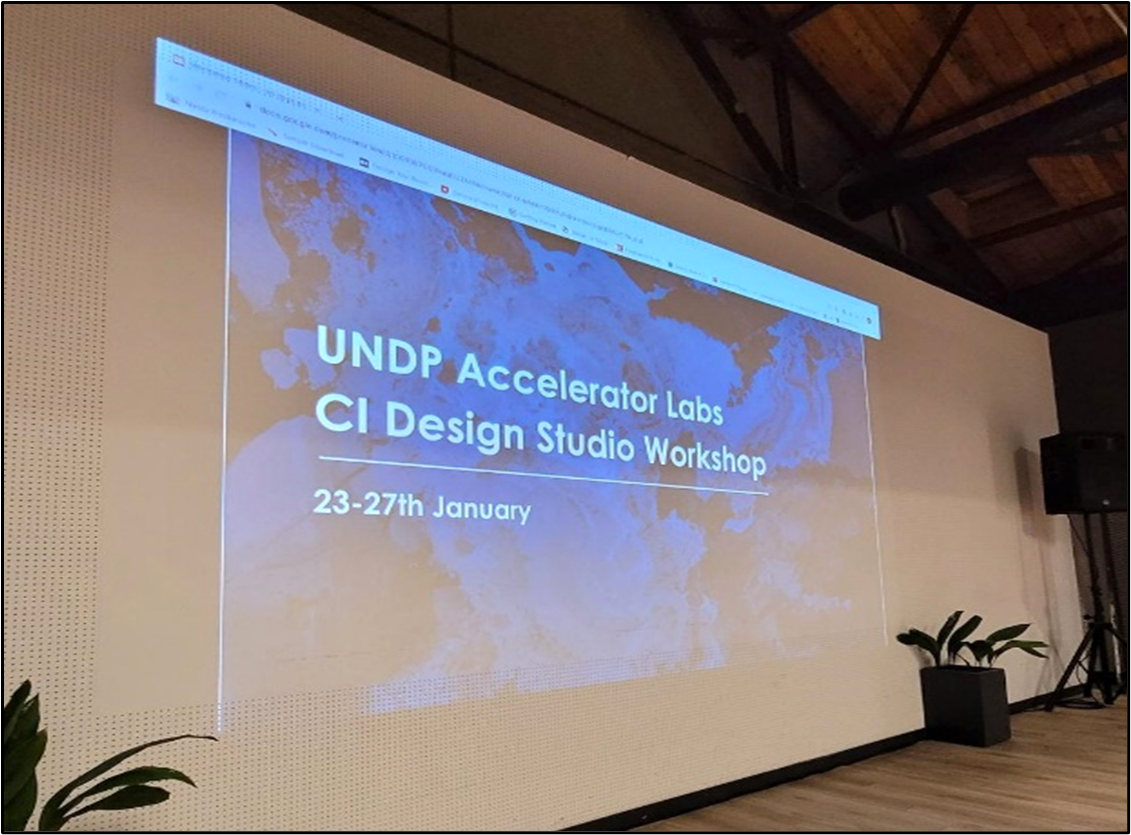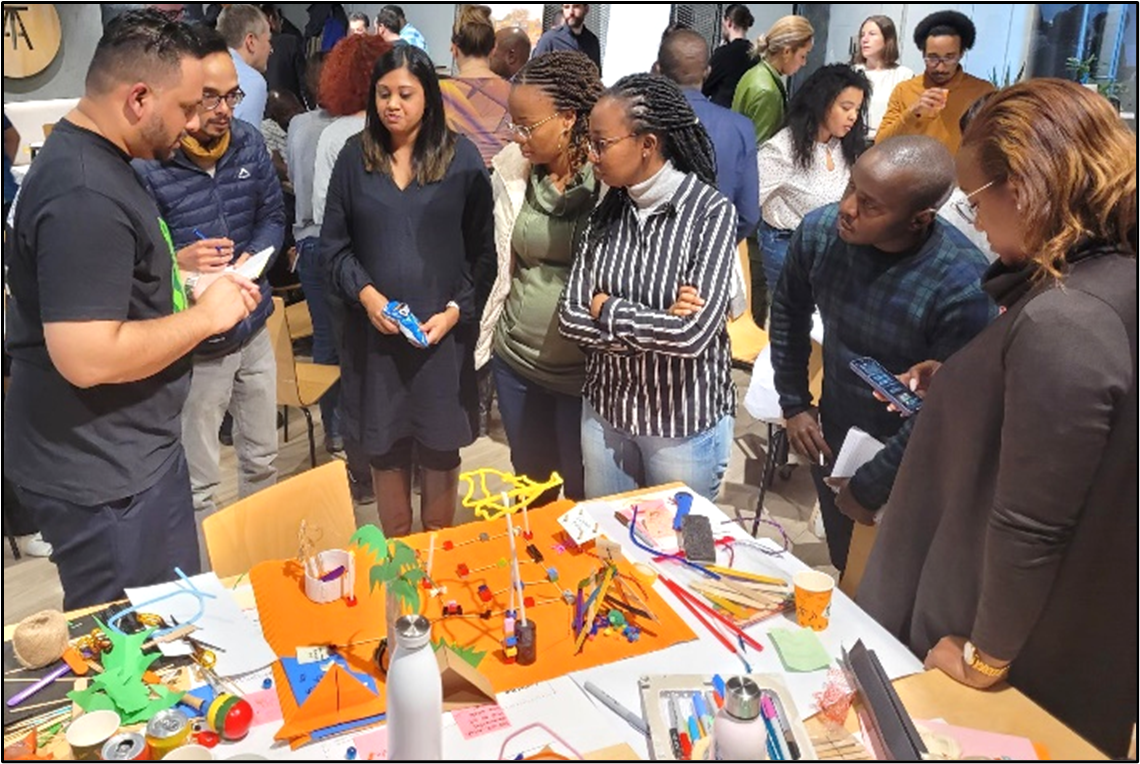Is Collective Intelligence the Answer to Today’s Complex Development Challenges? Tapping into Climate Change, Resilience, and Economic Empowerment Perspectives
December 8, 2023

The UNDP global accelerator labs joined forces with Nesta for a collective intelligence venture.
The UNDP global accelerator labs joined forces with Nesta once again for another collective intelligence venture. In 2020, cases studies from 13 Accelerator Labs contributed to a report titled Collective Intelligence for Sustainable Development: Getting Smarter Together, which highlighted the importance of harnessing the immense untapped knowledge and resources of the billions of humans for the achievement of the SDGs.
The report explored various methodologies that the UNDP Accelerator Labs (AccLabs) have been applying — such as ethnography, citizen science, innovation challenges and artificial intelligence — to help realize global development goals. It also highlights the urgency of supporting the collective action of various stakeholders such as governments, development partners, private sector, and grassroots communities, working together toward one goal — a more sustainable life on planet Earth.

Nesta's collective intelligence (C.I) design playbook features a variety of C.I methodologies.
This year, 15 AccLabs were selected to work alongside the Nesta team to explore how collective intelligence methodologies could help catalyze climate action. Over the year, labs from Fiji, Bolivia, Bosnia and Herzegovina, Guatemala, Kenya, Maldives, Mozambique, North Macedonia, Panama, Samoa, South Africa, South Sudan, Sudan, Togo, and Uganda learned and worked out loud to share how collective intelligence could be used to address climate change. Labs used various collective intelligence approaches to explore solutions for climate adaptation and mitigation. For instance, from mapping local solutions for more efficient water management in rural areas during droughts, to managing urban flooding, to managing climate-induced heat waves.
But first — what IS collective intelligence (CI)? Nesta defines this as diverse groups of people working together to mobilize a broader range of information, ideas and insights to address a particular challenge. While drawing on the knowledge and experiences of a large and diverse group of people to address a challenge may not exactly be revolutionary, it is the advances in today’s technology which can help harvest and analyze this information that has added an edge to collective human intelligence. While traditional development practices may have often involved data extraction for informing the design of solutions to development challenges, CI instead brings an emphasis on the need for data empowerment. Activities that involve sourcing information from communities should ultimately create value for those who have shared their time, experiences, and insights.
Getting Started
The 15 labs began their journeys in November 2022, connecting virtually to explore their respective climate change challenges and sharing their research propositions. In January 2023, the labs finally met at an in-person workshop in Istanbul, Türkiye which allowed for diverse cross-lab learnings. Teams got to hear firsthand experiences from countries across the global south about their respective climate change challenges, realizing how climate change impacts are affecting communities disproportionately across varying local contexts, as well as identifying some commonalities.
It was here, at the in-person workshop, that the labs were supported in creating and testing their value propositions, designing prototypes of their ideas, and taking a deeper dive into understanding the climate challenge and the stakeholders that would be part of the research. In other words, lab teams explored how their collective intelligence initiatives would bring value to the providers and users of the information captured.
This involved diving deeper into the research design, including matching the most suitable collective intelligence methodology to each labs’ CI proposal. After identifying the most suitable CI method, labs were able to design and peer review prototypes of each other’s CI proposals, develop and test value propositions amongst lab teams, and design action learning cycle roadmaps for the remainder of CI initiative.

UNDP AccLabs shared their prototype research ideas.
The United Nations Development Programme (UNDP) Pacific (Fiji) Accelerator Lab collective intelligence research focused on the disproportionate impacts of climate change induced extreme weather events such as tropical cyclones on rural communities. Given the increasing frequency and severity of cyclones being experienced, climate change is a serious threat to Fijian communities, the Fijian economy, and development progress. People living in remote communities are particularly vulnerable to climate change impacts as many of these communities have restricted access to basic services such as healthcare, social services, clean water, and energy. This limited access makes it difficult for remote communities to prepare for and recover from extreme weather events.
As such, the Fiji AccLab team applied CI methodologies together with the UNDP Pacific Inclusive Growth team, for on an ongoing project that is aiming to provide solar energy to the last four percent of Fiji’s population that live in remote, maritime areas that are not connected to the country’s main electricity grid. The teams co-facilitated and applied ethnography, deliberation, and storytelling methodologies to better explore how solar energy enabled services could help improve the quality of life of people living in remote communities, and how this could further increase their resilience to the impacts of climate change. By tapping into communities’ experiences and aspirations, the team aimed to determine the most suitable services that could improve communities’ quality of life and climate resilience.
In ensuring we keep data empowerment at the heart of the initiative, rather than data extraction, the intention was for the insights that were captured from the community to be used in the design of future tenders of the solar energy project, to include a suite of solar-enabled services that enables economic empowerment and increases climate resilience.
Additionally, the CI initiative can also help to identify skills and expertise within the community which can be refined and included in future energy projects sustainability and maintenance strategies—ensuring local ownership and increased capacity for adapting to climate induced natural hazards.
What’s next?
With the conclusion of the first phase of the thought process and design of the collective intelligence research, the Fiji AccLab went on to head into the field to conduct groundwork using the CI methodologies discussed earlier, collaborating with the community members of Vio Island — a remote community located in the Western part of Fiji. Insights gathered from the second part of this journey will be captured in part two of this series – stay tuned!
Acknowledgements:
Patrick Tuimalealiifano, Vineil Narayan and Vatimosi Delailovu of the UNDP Pacific Office in Fiji. Gina Lucarelli, Bas Leurs, Alexandru Oprunenco and the Nesta team for their guidance and input.
Special acknowledgement to the participants of Vio Island Community for sharing their invaluable time, expertise, and insights.

 Locations
Locations

